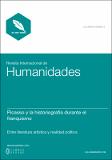Por favor, use este identificador para citar o enlazar a este item:
http://hdl.handle.net/10261/307045COMPARTIR / EXPORTAR:
 SHARE SHARE
 CORE
BASE CORE
BASE
|
|
| Visualizar otros formatos: MARC | Dublin Core | RDF | ORE | MODS | METS | DIDL | DATACITE | |

| Título: | Picasso y la historiografía durante el franquismo: entre literatura artística y realidad política |
Otros títulos: | Picasso and Historiography during the Franco Regime: From Artistic Literature to Political Reality | Autor: | Martínez López, Beatriz CSIC ORCID | Palabras clave: | Artistic Literature Francoism Cultural magazines Historiography Picasso Literatura artística Franquismo Revistas culturales Historiografía |
Fecha de publicación: | 30-sep-2021 | Editor: | Common Ground | Citación: | Revista Internacional de Humanidades 8(2): 63-78 (2021) | Resumen: | [EN] The hypothesis raised in this paper is based on the artistic literature written during the Franco regime (1939–
1975) and its consideration as a direct reflection of this convulsive period. Specifically, we use Pablo Ruiz Picasso
historiography and its role in shaping the discourses of collectivization and social unity. This is due to the fact that
Picasso concentrates a polyphony of critical agents who, from very different fields and ideologies, theorized about art,
and it is materialized in a wide and rich bibliographic corpus. The latter, written from both, the Spanish geography,
and the Republican exile of 1939, favors the comparative analysis of its critical perspectives. All of this reveals the
suitability of the picassian historiography in the interpretation of the political and socio–cultural realities in which it is
inscribed. [ES] La hipótesis que aquí se plantea parte de la literatura artística escrita durante el franquismo (1939–1975) y su consideración como reflejo directo de esta convulsa y contradictoria etapa. De manera específica se utiliza la historiografía generada en torno a Pablo Ruiz Picasso y su papel en la conformación del discurso de colectivización y unión social. Esto se debe a que en Picasso se concentra una polifonía de agentes críticos que, desde ámbitos e ideologías muy distintas, teorizaron sobre arte, y se materializa en un amplio y rico corpus bibliográfico. Este último, creado tanto en la geografía española como desde el exilio republicano español de 1939, favorece el análisis comparativo de los enfoques con que entonces la crítica se aproximaba al arte. Todo ello revela la idoneidad de la historiografía picassiana en la interpretación de las realidades políticas y socioculturales en que se inscribe. |
Descripción: | Este artículo está sujeto a una licencia CC BY 4.0 | Versión del editor: | https://doi.org/10.18848/2474-5022/CGP/v08i02/63-78 | URI: | http://hdl.handle.net/10261/307045 | DOI: | 10.18848/2474-5022/CGP/v08i02/63-78 | ISSN: | 2474-5022 | E-ISSN: | 2253-6825 |
| Aparece en las colecciones: | (CCHS-IH) Artículos |
Ficheros en este ítem:
| Fichero | Descripción | Tamaño | Formato | |
|---|---|---|---|---|
| Picasso_historiografia_franquismo.pdf | 442,12 kB | Adobe PDF |  Visualizar/Abrir |
CORE Recommender
Page view(s)
50
checked on 26-abr-2024
Download(s)
52
checked on 26-abr-2024
Google ScholarTM
Check
Altmetric
Altmetric
Este item está licenciado bajo una Licencia Creative Commons

